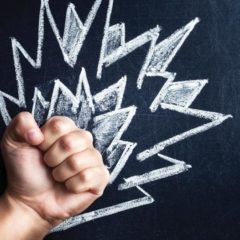Next year I will be returning part time to the classroom after a two-year hiatus as a new-teacher induction mentor (plus other duties as assigned). I will be returning with new strategies and ideas I’ve amassed from being able to observe and coach so many colleagues. More than that, I’ll be returning with a new mission, so to speak.
Many people have claimed that the election of President Donald Trump has given validation and permission for aggressive, disrespectful, and bullying language and behavior. Schools all over the nation have cited an increase in behavior where individuals in positions of real or perceived power have exercised this power to oppress, humiliate, intimidate, or undermine those over whom they felt somehow superior or powerful.
These power dynamics have a history far deeper than the 2016 election cycle. While Trump’s election took many in my own little echo chamber people by surprise, if we deconstruct the segments of the electorate who supported Trump, level headed thinkers of all political persuasions can acknowledge that a fundamental sense of powerlessness drove at least some proportion of the population to see Trump’s bravado as a means for reclaiming power. Powerlessness of one group or another is unfortunately woven into the very fabric of our history, and it just so happens that the current cohort feeling powerless actually turned out to be powerful enough to buoy someone into office who spoke directly to that void.
Through my years as a teacher and coach, in nearly every instance that I’ve responded to bullying language or behavior, as I’ve engaged with the “bully,” I’ve learned about their deep sense of powerlessness in some place of their life. Generalizing from real examples here, but the 9th grade bully always picking on the scrawny kid eventually reveals to me that he is frustrated by his own inability to succeed in school; the 10th grade girl known for vicious online peer-evisceration ends up revealing that she feels she has no sense of personal power because of what her parents say about her and do to her.
This is no profound new idea. It is Interpersonal Dynamics 101 and in each child psychology textbook. Bullying behavior is often an attempt to fill some personal power void.
As I look at how schools have attempted to deal with bullying over the years, much has been focused on the “don’t bully, be kind” approach. That’s great, but it is only part of the answer. I think we need to also talk more openly about power and powerlessness.
That’s the great thing about being a literature teacher: Literature lets us study humanity as a third point, and in doing so we can better understand ourselves and our society. Every work of fiction I’ve ever taught (and in fact even much of the poetry and nonfiction) has clearly visible in it dynamics rooted in a differential of real or perceived power.
I will say that the events of our presidential election have rekindled my sense of urgency in helping students consider deeply the inequality of power that is so entrenched in our society that. My mission is to help adolescents peel away a fundamentally flawed assumption that we often make about ourselves, bias and our society: As Mahzarin R. Banaji and Anthony G. Greenwald describe in the book Blindspot: Hidden Biases of Good People, we assume that inequality and power differentials are simply an inevitable and unalterable law of nature, and that these differentials exist because of some deep truth about those who occupy different stations of power.
Through my teaching of literature, now more than ever I believe it will be important to examine how power and powerlessness contribute to a story’s central conflict so that perhaps we can better understand how it also exists as the core of nearly all of our society’s central conflicts. I believe it will be more important than ever to help my adolescent students explore where in their own lives and in our broader culture they are bestowed or refused power, even if they don’t necessarily recognize or want to acknowledge it (the very blind spot at the core of the book linked above).
I hope to help my students consider those stations where they have power how they use it, as well as how their sense of powerlessness ripples inward or outward toward other moments of their lives. I do think we’ve always lived in a bully culture. Like any pattern of human interaction, it has ebbed and flowed. We in public education have the opportunity to arm young people with the knowledge and skills to turn the tide.

Mark, that’s interesting that you are finding that common thread as you talk with your students. We had a PD day a few years ago where the speaker gave a different perspective. He shared research indicating bullies were the most self-assured people in a group. He said bullies characterized victims as “weak” because they didn’t stand up for themselves. Maybe there are both kinds of bullies?
I think it is an “and,” not an “or.” I think someone who ends up exhibiting bullying behavior can be remarkably self assured when in that place over power over the other who is perceived as weak. I’ve told my own sons that one of the best defenses against run-of-the-mill school bullying is to laugh…I do think that bullies target those who they perceive they can exert power over (those they see as weaker), and to laugh means to not take seriously the power play. It has worked remarkably well.